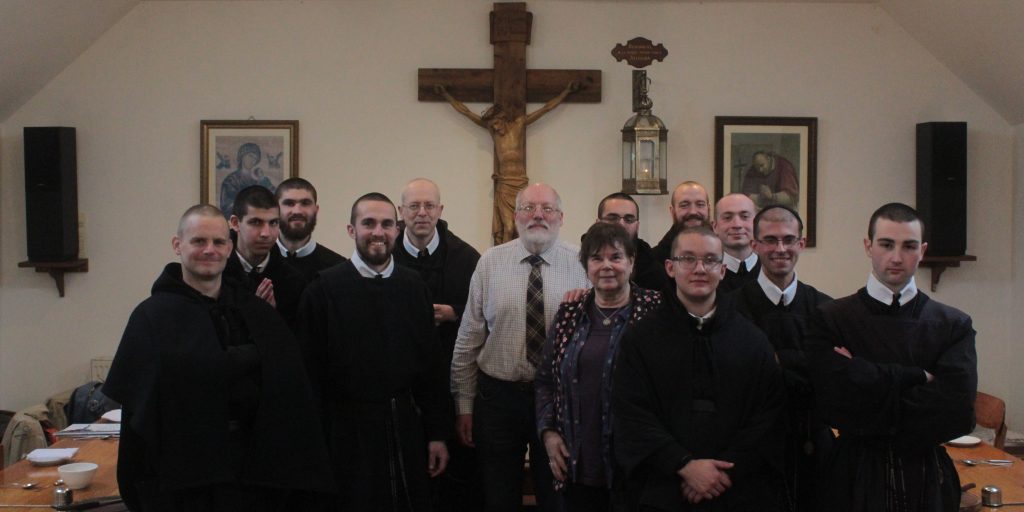Stephen Clackson’s Letter from School Place
A regular report from your councillor, representing all communities in the North Isles.
Issue 146 — March 2025
Ute and I were delighted to accept an invitation to visit one of the smaller communities in the North Isles Ward and spend a day with The Sons of The Most Holy Redeemer on Papa Stronsay. We enjoyed a tour of the island and of the monastery and were made to feel most welcome. It is impressive everything that The Sons have achieved in the quarter-century their order has been present on the island, and all that they currently do and have planned for the future. I am familiar with many aspects of their daily life from the experience I had living in the Iona Community before Ute and I got married. Here we are in the refectory.

At our General Meeting nearly three-quarters of councillors ratified the 15% rise in council tax agreed by the Policy & Resources Committee. This is high, but it follows a spell of many years during which the Scottish Government forbade any council tax rises. Had we been able to make incremental increases year on year, it is unlikely we would be in our current “cost-of-service-delivery crisis” (as Council Leader, Heather Woodbridge put it). This increase equates to an extra £3.95 per week per household living in a Band D property. Although our council tax increase is higher than that of most other councils in Scotland, it has to be borne in mind that we started from a lower base. Furthermore, it costs more here to provide services, both because, being a small authority, we cannot take advantage of economies of scale, and, owing to our geography, we have to carry the burden of extra transport and delivery costs, and, don’t forget, OIC provides services few other councils need to, such as island airfields and harbours. On top of this, the Scottish Government underfunds us compared with the other two island authorities: it gives Orkney £266 less per head of population than it gives Shetland and £644 less per head than its gives the Western Isles. And in order not to have to make major cuts in services under these constraining conditions, we have been drawing on our reserves unsustainably. It was never expected that a council tax rise of this magnitude would be a popular decision. Nevertheless, the public told us it was willing to pay higher levels of council tax in order to protect council services. Of the 1,077 folk who took the trouble to respond to the “Our Budget Challenge” survey and make considered contributions, 47% said they’d be willing to pay increases of either 15% or 20% (while 40% expressed preference for a 10% increase). I recognised the initial shortcomings in this survey (see Issue 143 of my Letter) but it was redeemed by the way the results were analysed. Nobody (including councillors) likes paying extra tax, but our decision was a carefully considered one based on all the information before us, and it was made for the right reasons in the hope that it will give us some protection against making drastic cuts in services and severe council tax increases going forward. In setting our budget, I am pleased that we were able (as Isles residents requested in the survey) to avoid levying charges for pupils to stay at the Papdale Halls to attend extra-curricular activities, charges for Hall placing requests, and charges for our black rubbish bags. (For the record, my nationally-set combined councillor and Orkney & Shetland Valuation Joint Board Depute Convener salary will be rising by less than 6%.)
It will not have escaped the notice of those engaged in Orkney’s agricultural economy that at the same General Meeting councillors approved a Notice of Motion protesting how the UK Government’s budget will affect our farming communities.
Some other meetings I have attended this month included the usual confidential members’ briefings with the Chief Executive, a Special General Meeting, and a meeting of the House Working Group to discuss how to commemorate the 50th anniversary of Orkney Islands Council in May. Virtually, I attended a meeting of the Dounreay Stakeholder Group as OIC’s representative.
